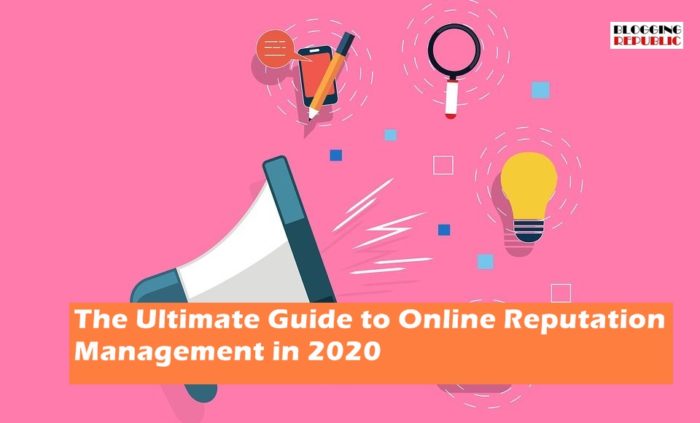Business is not what it used to be 20 years ago. Search engines, review sites, social media, and digital marketing have completely changed businesses. While these technological developments provide tons of ease in doing business, they also open new dimensions that business owners cannot afford to ignore. Read on our ultimate guide to online reputation management in 2020.
Nearly every customer today searches for businesses online, write customer experience reviews online, evaluate businesses against competitors through online sources and campaigns, and sometimes even make purchases online.
Table of Contents
Online Reputation Management: Advantages

Since most business owners already have their hands full with operations and business growth to handle, it is a good idea to outsource important but secondary business segments to other companies. One of these is online relationship management. Online reputation management companies can help businesses in several ways:
1. Better Reputation with Clients
Building a reputation is a time taking process. Companies that focus on building an image that shares core values wits its target clientele, tend to have stronger brand loyalty and following.
It is important to give customers a sense of belonging and let them feel they are supporting good values by purchasing from your business. Over time, this repute results in better sales which translate in higher revenues and profits for the company.
2. Helps in Damage Control
In any business, at some point, things will go wrong. It might be unhappy customers, union troubles, government matters at even force majeure. If such troubles in business are imminent, a plan to control the damage on the public front is also necessary.
Having the help of a professional ORM company enables businesses to spring into immediate damage control and share their side of the story with their customers. In the digital world, stories spread rapidly, delayed or no response from any business in such a situation will reflect poorly on the business and will almost certainly affect business sales and image.
Professional ORM companies are well-versed in dealing with any untoward situations, and business owners can benefit from their practical experience and advice in any unexpected situations.
3. Brings Customers Back
A business’s success truly depends on returning customers. They not just fuel the sales but also act as word of mouth ambassadors sending in more clients. No matter how much attention to detail is exercised, there will inevitably be some unhappy customers over time.
While there is no way never to end up having dissatisfied customers, there are many ways to plan how to deal with any such untoward situations.
Unhappy customers are more likely to speak of a business to their friends and family. It is very important to make the utmost efforts to reasonably satisfy the customer. ORM companies know well how to manage customers leaving you bad reviews on social media and review sites.
While no business can stop unhappy customers from posting negative reviews, ORM companies can seek out such content on the go and respond to the customer at the same platform. Doing this not only helps resolve that particular customer’s complaint but also sends a message to other readers that the business takes customer satisfaction seriously.
4. Helps to Counter Negative Propaganda
Let us be realistic here. Unfortunately, propaganda is a tool sometimes used by competitors in business. It is critical for a business to be able not just to counter the negative image created by a propaganda campaign, but also to generate positive reviews and publicity quickly.
Your reputation is your most valuable currency. Unfortunately, its value isn’t always transparent. Your personal, professional, or organizational cachet can fluctuate from month to month, week to week, even day to day, depending on what’s being said about you online.
12 Steps to Improve Online Reputation
The downside risks are truly alarming. According to Graham Winfrey of Inc, roughly 80% of consumers simply refuse to buy from businesses with negative reviews. For individuals, derogatory search results and negative social media mentions too often mean the difference between “You’re hired!” and radio silence.
There are no shortcuts here. Stabilizing and improving your digital reputation takes time — longer than you might like. The good news is that the process isn’t rocket science. In fact, you can get a head start by incorporating these 12 step guide to online reputation management.
1. Take Your Issue Directly to Google
If you’re up against a derogatory result that you believe is unfounded, such as a copyright infringement that reflects poorly on your organization or a diatribe containing explicit material that violates the terms of Google’s SafeSearch, you can take the issue directly to Google.
Start by reviewing Google’s instructions for requesting removal of negative search results on web properties that you don’t control.
2. Monitor Your Online Reviews
Yes, individual online reviews are visible in search engines. As noted up top, even a single negative review can be devastating to your online image. Since you can’t please all the people all the time, hoping and praying that you’ll maintain an unblemished review profile simply isn’t a sustainable approach. (How to Improve Online Reputation with SEO?)
Use a tool like Google Alerts or ReviewTrackers (there are dozens of others) to automatically track your mentions on popular review sites like Yelp and Google Maps. Look to “reviews” on social media as well — Twitter and Facebook attract sour reviews like flies.
3. Challenge Inaccurate Directory or Database Information
Google results and review websites aren’t the only sources of false or misleading complaints. Business directories and databases, such as the Better Business Bureau, can contain dubious information about small businesses and independent professionals.
Every directory’s procedure is different, and some are more resistant to pressure than others, but it’s often possible to resolve complaints. This is almost as good as removing the result outright. For instance, resolved Better Business Bureau complaints are effectively minimized — a record of the incident remains, but it’s not the first thing searchers see.
4. Set Up “Exact Match Domains”
Most serious reputation management efforts require fresh, positive content built around “exact match domains” controlled by you or your allies. Exact match domains’ URLs contain your (or your organization’s) name: yourname.com, yourname.org, yourname.net.
Once you’ve set up your exact match domains, develop a realistic content creation and publishing strategy. The goal here is to build multiple homes for original content that reflects positively on your accomplishments, interests, projects — whatever reflects best on your brand and aligns with your broader self-promotion strategy. (“Self-promotion” sounds gauche, but that’s what it is.)
5. Fortify Your Social Media Presence
At the outset, your exact match domains won’t rank well in your organic search results, particularly if you’re already a popular subject.
Your social media profiles are another story. Facebook, Twitter, LinkedIn, Instagram, Pinterest — when it comes to SEO value, they’re all as blue as blue chips can get. If your reputation troubles have already bled into your social media sphere of influence, set up new social profiles and follow social media best practices to promote your interests, including the occasional plug for original content posted to your exact match domain sites. (How to Improve Online Reputation with SEO?)
6. Use Your Sphere of Influence to Build Positive Links
It’s a big digital world out there. Social media alone can’t shoulder the immense burden of your online reputation.
Supplement your exact match domains with niche websites that play to specific facets of your personal or professional persona. Stock them with quality content. Create link networks between them, your social media profiles, and your exact match domains. Pursue reciprocal posting arrangements with authoritative publishers in your field — you’ll be surprised how many are willing to play ball.
The goal here is to create an umbrella of positive content that slowly but surely renders your negative mentions less visible to casual searchers. In industry parlance, this is known as “suppression.”
7. Develop and Leverage Positive Multimedia Content
Last, but not least: It’s almost impossible to overstate the SEO value of video. If a picture is worth a thousand words, video is worth — well, a lot more.
If you don’t have one already, create a YouTube account and start developing compelling video content that people actually want to watch. You don’t need a professional writing staff or glossy production values, just engaging, from-the-heart videos that educate viewers.
Your videos’ subject matter will depend on what you and/or your company do. You yourself don’t have to be the central focus of each piece — in many cases, it’s better that you’re not. As long as the content is compelling and your target keyword is included in the URL, channel name, and tags, you’ll have done your part. (How to Improve Online Reputation with SEO?)
Follow the same process with photographic content. Create a Flickr account, upload original photos, and use your sphere of influence — including your exact match domains, guest posts, and niche websites — to point traffic to it.
8. Make sure your customers trust you:
You need to give a reason for the customers to trust you. You need to follow ethical business practices and ensure that the associates and customers get to know you. Build relationships and trust early in the business because it is difficult to make friends in the midst of a crisis. Every customer you serve should have a reason to trust you.
9. Stay alert on what is written online about you:
When you receive positive reviews and appreciation for your business or products, make sure you take out time and acknowledge the same. If you see negative reviews or comments, take time and address them as pleasantly as you can. Damage control is more effective when it comes at the right time. If there is something crucial, you need to keep calm and address a concern patiently.
10. Notice what people are talking about you:
There are many consumers who use social media to inquire about products or services. They tend to use Facebook or Instagram for the same. You need to scan the pages and be aware of what people are saying about you. If you use social media for product promotions, you need to be aware of what consumers are saying about you on different channels.
11. Keep your emotions in control when responding to critics:
You need to keep in mind that you are not having a private conversation here. The entire world will see how you respond to a comment and it is best to keep your emotions in control when you respond to critics.
12. Defend yourself from illegal attacks:
Do not become a doormat and do not take everything that the consumers or clients give you. If you go through defamation of character, ask local authorities to assist you and do not be shy about anything.
You might have a number of things on hand and it is not possible for you to look after every aspect of the business. This is why it is advisable to hire professionals to manage the reputation of your business. Focus on what the company needs and allow a professional to manage your reputation.
Ultimate Guide to Online Reputation Management : Conclusion
Starting a business takes a lot of sweat and tears, and if you have set up your such venture, we would like to congratulate you. However, you must look into reputation management, as it works as a cushion to protect your business from naysayers and critics at all times.
The bottom line of this guide to online reputation management: think of it all from a third-party perspective and forget that it can all be done offline like the old times. There must be someone who watches out for your reputation on the world wide web, so better embrace this fact as soon as you can.
If you want to ask any questions about this guide to online reputation management or want us to clear confusion, we are a call or message away!
- Can Brain Games Make You Smarter? Try These 3 Games to Know - January 22, 2020
- The Ultimate Guide to Online Reputation Management in 2020 - January 4, 2020
- 20 Essential Mobile Apps for Business Professionals in 2020 - December 31, 2019



